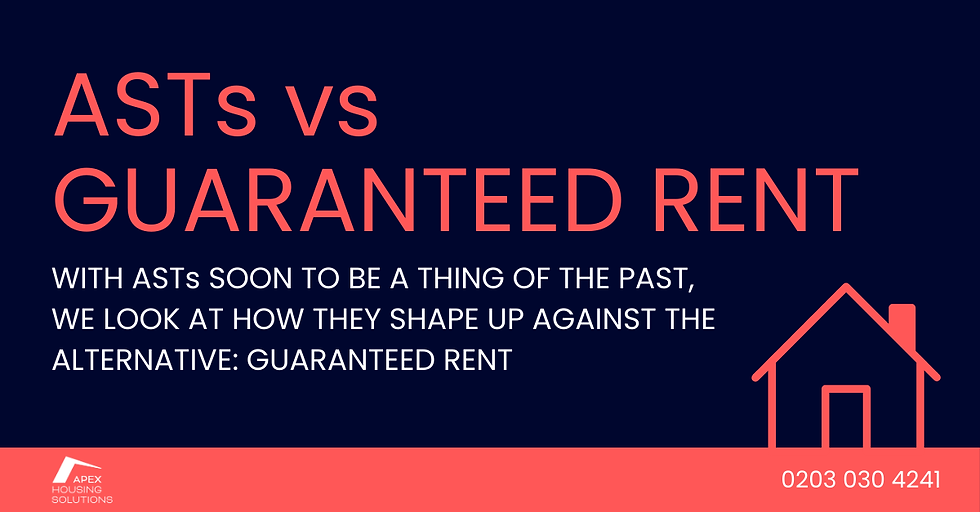Awaab’s Law Explained: What Landlords Need to Know (and how guaranteed rent can help)
- Apex Housing Solutions

- Oct 27, 2025
- 3 min read

Awaab’s Law Explained: What Landlords Need to Know
Awaab’s Law is due to come into effect following the tragic death of two-year-old Awaab Ishak, who sadly passed away following prolonged exposure to mould in a social housing property in 2020. While the new legislation applies directly to social landlords, it’s a clear signal to the wider housing sector: damp, mould and poor property conditions are now a legal and reputational risk.
For landlords operating in the private sector, especially those housing tenants via local authority schemes, this is the standard the market is now working towards, and in many cases, expecting.
What is Awaab’s Law?
Awaab’s Law introduces new legal timeframes for dealing with damp, mould and other health-related hazards in rented homes.
It requires social landlords to:
Investigate reported hazards within 14 days
Begin necessary repairs or remediation within 7 days of identifying a health risk
Act within 24 hours where the issue poses a serious and imminent risk to health
Provide tenants with clear information on how to report hazards, and on the actions being taken
The legislation is being added to the Social Housing (Regulation) Act 2023 and is expected to take effect fully in summer 2026, with consultation and secondary legislation being finalised.
Why It Matters for the Wider Market
Although Awaab’s Law applies to social landlords, it sets a new precedent. Local authorities, housing partnerships, and commissioning alliances are already starting to align private procurement and management expectations with the same timeframes and standards.
This means:
Landlords working with local authority leasing schemes or guaranteed rent companies may be assessed against Awaab’s Law-style response standards
Enforcement action could be escalated faster, especially where vulnerable tenants are involved
Delays to damp and mould response could risk rent repayment orders, reputational damage, or contract non-renewal
What Are the Penalties?
The law strengthens enforcement powers for the Housing Ombudsman and the Regulator of Social Housing. While direct penalties don’t yet apply to PRS landlords, the wider consequences are clear:
Faster escalation from tenants or occupants
More local authorities requiring evidence of repair tracking and inspection processes
Higher expectations for preventative property maintenance
How Apex Helps Landlords Stay Ahead
Apex already operates to higher standards than those required under Awaab’s Law. Why? Because delayed repairs, unresolved damp and occupant complaints don’t just affect tenants, they risk our rent being withheld by the council. And since we guarantee rent to landlords regardless, that’s a commercial risk we can’t afford to ignore.
Every property under a guaranteed rent agreement with Apex benefits from:
Regular inspections, minimum twice per year, often more
Centralised maintenance tracking, issues logged, reviewed, and escalated within hours
In-house Property Liaison team, visiting properties, following up on completed works, and closing the loop
Rapid response, for any hazard reported by the occupant, our PM team acts quickly and keeps everything on record
What Landlords Should Keep in Mind
Awaab’s Law reflects a shift in how housing quality is being regulated. It’s no longer enough to rely on periodic checks or expect tenants to manage issues themselves. Landlords are being expected to take responsibility, act quickly and document everything.
Apex helps landlords meet that standard without the pressure. No grey areas, no gaps in process, just clear systems that protect the property, the occupant, and the income.
To find out more about how Apex manages property condition under guaranteed rent agreements:
📞 0203 030 4241




Comments